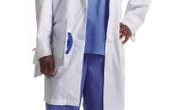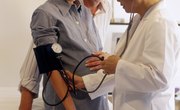Endocrinology is an area of medicine that focuses on hormones and organs that secrete these hormones including the pituitary and thyroid glands as well as ovaries, testes and the pancreas. Students who are interested in studying medicine and in becoming endocrinologists have to complete four years of a bachelor's degree, four years of medical school and three years of residency work.
Pre-Med Requirements
High school students who know that they want to become endocrinologists can prepare for pre-med requirements by taking certain courses in biology, chemistry, physics and mathematics. Pre-med requirements are courses that medical schools require prospective applicants to complete prior to applying to their programs. (Reference 1, 2, 3) These courses give students a strong foundation in medicine-related subjects and are prerequisites for all medical schools. Requirements vary, but most programs require students to take general biology, microbiology, general chemistry, organic chemistry, general physics and calculus. All of these courses except calculus have laboratory components that give students experience in performing research work.
Biology
To prepare for the rigor of pre-med requirements in college, high school students should take a year of introductory biology and a course in advanced placement biology. AP Biology is a high school course for which students can receive college credit if they pass the AP exam at the end of the school year. Biology is the study of life and these courses introduce students to concepts such as cells, cellular functions and taxonomy. (Reference 1, 2, 3) This course typically has a laboratory component that allows students to get their first experience in handling biological organisms.
Chemistry
Another important subject for all students who are interested in becoming doctors and endocrinologists is chemistry. Medical schools require students to have two full years of chemistry, one general chemistry and one organic chemistry. (Reference 1, 2, 3) High school students who want to prepare for these courses should take an introductory course in chemistry and AP chemistry, if it is available. High school chemistry courses give students experience handling chemicals and chemistry laboratory materials and introduce them to topics such as the periodic table of elements, compounds, acids and bases and chemical reactions.
Physics and Mathematics
Students planning on taking pre-med courses in college should also take physics and mathematics courses in high school. In particular, they should take as many mathematics courses as their high school offers including pre-algebra, algebra 1 and 2, trigonometry or pre-calculus and AP calculus, if it is available. Furthermore, students should also take an introductory course in physics and AP physics, if it is available. These courses give students who are interested in becoming endocrinologists the tools to succeed in college-level calculus and physics courses. (Reference 1, 2, 3)
Related Articles
References
Writer Bio
Kate Prudchenko has been a writer and editor for five years, publishing peer-reviewed articles, essays, and book chapters in a variety of publications including Immersive Environments: Future Trends in Education and Contemporary Literary Review India. She has a BA and MS in Mathematics, MA in English/Writing, and is completing a PhD in Education.











